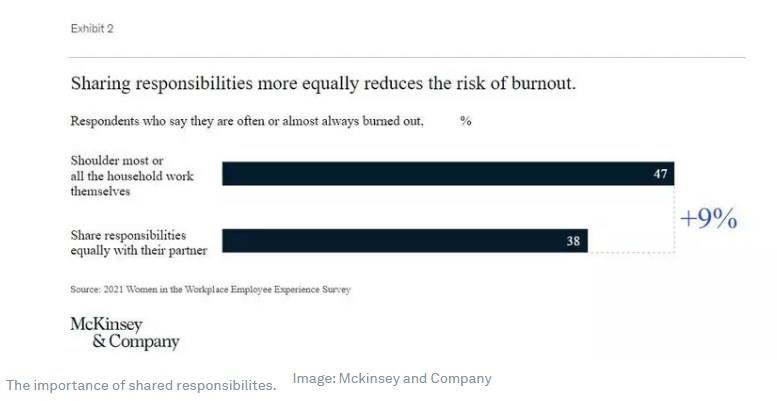by Cassie Werber*
Companies and managers should step up to help employees navigate a fairer division of labor at home, according to research from McKinsey.

Burned out employees work less effectively, the researchers reason, and there are few surer routes to burnout than striving without cease both at work and at home, especially when bringing up kids in the process. The problem is felt by everyone, but women more than men: 42% of all women and 35% of men in the study reported being burnt out. That rose to 46% for mothers and 39% for fathers.
They also found that a significant number of employees feel judged when asking for career flexibility, but women feel it more than men, implying that they might be more willing to take on too much rather than ask for what they need. Both men and women were worried that consistently working remotely would make them appear less committed to their careers.
Employers have a responsibility to help improve this situation, McKinsey said. So what can companies do to promote equity at home?
1. Increased flexibility for all employees. Giving women the flexibility to take time off when a child is sick arguably means mothers will always do that work. Men need equal flexibility. McKinsey suggested strategies including not scheduling meetings at typical school drop-off or collection times, and ensuring hybrid and flexible work options are open to all. They also counseled firms to make sure women and men return in equal numbers when offices finally re-open.
2. Equalizing benefits. Parental and adoption leave, for example, should be offered to all, and everyone should be encouraged to make use of them.
3. Role-modeling. Managers can make teams feel comfortable talking about household responsibilities, and should avoid assuming that any particular team member has certain responsibilities or desires, or that high-performing team members don’t have them.
Sorting out the persistent structural gender imbalance in workplaces isn’t work that couples should have to do in isolation. “Supporting dual-career employees is a business imperative,” the researchers concluded, “one that will become even more important as companies navigate what work looks like postpandemic.”
*Writer, Quartz Africa
**first published in: www.weforum.org




 By: N. Peter Kramer
By: N. Peter Kramer
